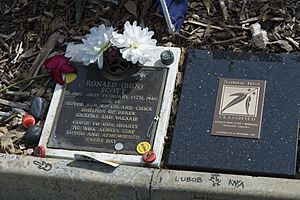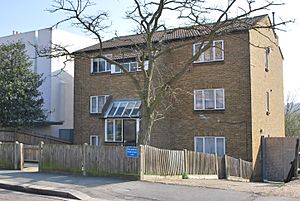Bon Scott facts for kids
Quick facts for kids
Bon Scott
|
|
|---|---|
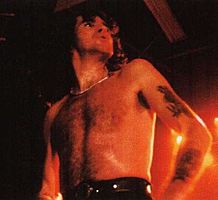
Scott performing with AC/DC in 1979
|
|
| Background information | |
| Birth name | Ronald Belford Scott |
| Born | 9 July 1946 Forfar, Angus, Scotland |
| Died | 19 February 1980 (aged 33) East Dulwich, London, England |
| Genres | |
| Occupation(s) |
|
| Years active | 1964–1980 |
Ronald Belford "Bon" Scott (born 9 July 1946 – died 19 February 1980) was an Australian singer and songwriter. He is best known as the lead singer and lyricist for the famous hard rock band AC/DC. He was with the band from 1974 until his death in 1980.
Bon Scott was born in Forfar, Scotland. He spent his early childhood in Kirriemuir. In 1952, when he was six, his family moved to Australia. They lived in Melbourne for four years before settling in Fremantle, Western Australia.
With AC/DC, Bon Scott sang on the band's first seven albums. These included High Voltage (1975), T.N.T. (1975), Dirty Deeds Done Dirt Cheap (1976), Let There Be Rock (1977), Powerage (1978), and Highway to Hell (1979).
Scott started his first band, the Spektors, in 1964. He was the drummer and sometimes the lead singer. He also performed in other bands, like the Valentines and Fraternity. In 1974, he joined AC/DC, replacing their first lead singer, Dave Evans.
AC/DC became very popular throughout the 1970s. They first gained fame in Australia, then worldwide. Their 1979 album, Highway to Hell, became a top 20 hit in the United States. The band was about to become even more successful. Sadly, Bon Scott died on 19 February 1980. AC/DC thought about stopping, but they decided to continue. They found a new singer, Brian Johnson. AC/DC's next album, Back in Black, came out just five months later. It was a tribute to Bon Scott. This album became one of the best-selling albums of all time.
In 2004, Classic Rock magazine named Bon Scott the number one "Greatest Frontman of All Time." Hit Parader magazine also ranked him fifth on their 2006 list of the "100 Greatest Heavy Metal Vocalists."
Contents
Bon Scott's Life Story
Early Years: 1946–1964
Ronald Belford Scott was born on 9 July 1946, in Forfar, Scotland. His parents were Charles and Isabelle Scott. He grew up in Kirriemuir. Bon was the second child, and his younger brother, Derek, was born in 1949. His parents ran a family bakery in Kirriemuir. The Scott family moved from Scotland to Australia in 1952.
They first lived in Sunshine, Victoria, a suburb of Melbourne. Bon went to Sunshine Primary School. He got the nickname "Bon" soon after starting school. There was another Ronald in his class, so his friends called him "Bon" from "Bonnie Scotland." His youngest brother, Graeme, was born in 1953.
In 1956, the family moved to Fremantle. Bon joined the Fremantle Scots Pipe Band and learned to play the drums. He went to North Fremantle Primary School and later John Curtin College of the Arts. He left school at age 15. After school, he worked different jobs, like a farmhand and a fisherman. He also tried to join the Australian Army but was not accepted.
First Bands: The Spektors and The Valentines (1964–1970)
Bon Scott was inspired by the singer Little Richard. After working as a postman and bartender, Bon started his first band, the Spektors, in 1964. He played drums and sometimes sang lead. In 1966, his band joined with another local band, the Winstons. They formed the Valentines. Bon was a co-lead singer with Vince Lovegrove.
The Valentines recorded several songs written by George Young from the Easybeats. Their song "Every Day I Have to Cry" became a local hit. In 1970, their single "Juliette" reached the National Top 30. After this, the Valentines band broke up.
Fraternity (1970–1973)
In 1970, Bon Scott moved to Adelaide. He joined a progressive rock band called Fraternity. Fraternity released two albums, Livestock and Flaming Galah. They then toured the UK in 1973 and changed their name to Fang. During this tour, they opened for bands like Status Quo and Geordie. The singer of Geordie was Brian Johnson, who would later become AC/DC's lead singer after Bon's death.
On 24 January 1972, Bon Scott married Irene Thornton.
In 1973, after returning to Australia, Fraternity took a break. Bon worked at a fertilizer plant. He also started singing with the Mount Lofty Rangers. This was a group of musicians led by Peter Head. They would get together to write and try out new songs. Bon recorded vocals for their songs "Round & Round" and "Carey Gully."
Like Bon Scott, Malcolm Young and his younger brother Angus Young from AC/DC were also born in Scotland. They moved to Australia with their family when they were children. Fraternity later got back together, but Jimmy Barnes became their new singer.
Joining AC/DC (1974–1980)
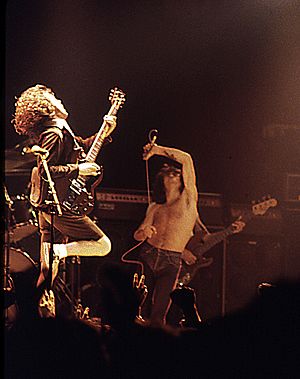
Bon Scott's wife, Irene Thornton, later shared how Bon first saw AC/DC in August 1974. The band was playing a show in Adelaide. Irene said that AC/DC had just fired their singer, Dave Evans, and they wanted Bon to join. Bon and the Young brothers (Angus and Malcolm) were all from Scotland, so they connected right away.
Bon Scott became the lead singer of AC/DC on 24 October 1974. He had been working as a driver for the band. After an audition, he became their new frontman.
With Angus and Malcolm Young on guitars, Phil Rudd on drums, and Mark Evans on bass, AC/DC released their first album in Australia, High Voltage, in February 1975. They quickly recorded their second album, T.N.T., released in Australia in December 1975.
The first AC/DC album released worldwide was also called High Voltage. It came out in May 1976 and included songs from their first two Australian albums. Another album, Dirty Deeds Done Dirt Cheap, was released in September 1976 in Australia. The international version came out later with different songs.
In the next few years, AC/DC became even more successful with their albums Let There Be Rock and Powerage. The 1978 album Powerage was the first to feature bassist Cliff Williams. It had a harder sound, similar to Let There Be Rock. The song "Rock 'n' Roll Damnation" was released as a single and became AC/DC's highest-charting song at that time. A live show from the Powerage tour was recorded and released as If You Want Blood You've Got It.
The band's sixth album, Highway To Hell, was produced by Robert "Mutt" Lange. It was released in 1979. This album was AC/DC's first to reach the top 100 in the US, climbing to #17. It helped make AC/DC one of the top hard rock bands.
On 9 February 1980, AC/DC appeared on a TV show in Spain. They played "Beating Around the Bush," "Girls Got Rhythm," and "Highway to Hell." This was Bon Scott's last public performance with AC/DC before he passed away.
Bon Scott's Marriage
Bon Scott met Irene Thornton in 1971 in Adelaide. He was the lead singer for Fraternity at the time. They got married in 1972. After two years, they separated and later divorced in 1977. However, they remained friends until Bon's death.
Bon Scott's Passing
Bon Scott passed away on 19 February 1980, at the age of 33. The official report stated it was a "death by misadventure."
Bon Scott's body was cremated, and his ashes were buried by his family at Fremantle Cemetery in Fremantle.
After Bon's death, the remaining members of AC/DC thought about stopping the band. But they decided Bon would have wanted them to continue. With encouragement from Bon's family, the band hired Brian Johnson as their new singer. Five months after Bon Scott's death, AC/DC released Back in Black. This album was a tribute to Bon. There is still discussion about whether some of Bon's lyrics were used on the album without credit.
Bon Scott's Legacy
Important Places and Tributes
Australia
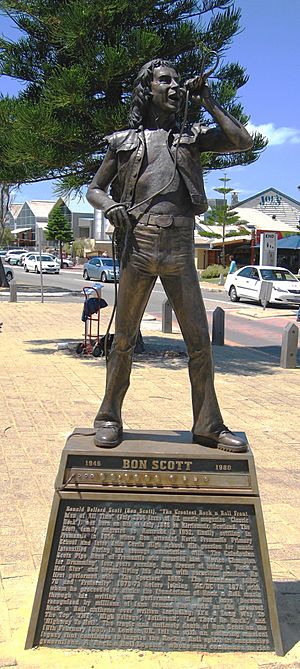
Bon Scott's grave site has become a very important place. More than 28 years after his death, the National Trust of Australia said his grave was important enough to be listed as a heritage site. It is said to be the most visited grave in Australia. On 7 July 2006, for his 60th birthday, the cemetery board improved the Bon Scott Grave Area. They added a Bon Scott Arch and a Memorial Entrance gate. On 9 July 2006, a bronze plaque was stolen from the site.
A bronze statue of Bon Scott was revealed at Fremantle Fishing Boat Harbour in Western Australia on 24 February 2008. The statue shows Bon Scott standing on a Marshall amplifier.
ACDC Lane is a street in the central business district of Melbourne. It was renamed on 1 October 2004, to honor AC/DC. Melbourne's Lord Mayor, John So, officially opened ACDC Lane. He said, "As the song says, there is a highway to hell, but this is a laneway to heaven. Let us rock." Bagpipers then played "It's a Long Way to the Top (If You Wanna Rock 'n' Roll)." These were all songs from the Bon Scott era. The lane has a rock 'n' roll nightclub called the Cherry Bar.
Scotland
On 6 May 2006, the town of Kirriemuir in Scotland held a service. They revealed a stone slab to remember the singer.
A life-sized bronze statue of Bon Scott was revealed in Kirriemuir on 30 April 2016. Former AC/DC bass player Mark Evans helped unveil it. This happened during the 10th anniversary of the Bonfest music festival. Kirriemuir hosts an annual festival called "Bonfest" to celebrate Bon Scott and AC/DC. The statue was made by John McKenna.
Music Releases After His Death
AC/DC released a box set called Bonfire on 18 November 1997. It was a tribute to Bon Scott. It includes a remastered version of Back in Black. It also has an album of rare songs called Volts. Plus, there are two live albums: Live from the Atlantic Studios (recorded in 1977) and Let There Be Rock: The Movie (recorded in 1979). The Let There Be Rock: The Movie album was the soundtrack for the movie AC/DC: Let There Be Rock.
Awards and Tributes
AC/DC's seventh studio album, Back In Black, was released as a dedication and tribute to Bon Scott. In 2003, Bon Scott was added to the Rock and Roll Hall of Fame as a member of AC/DC. His nephews accepted the award for him.
In 2003, Bon Scott's last studio album with AC/DC, Highway to Hell (1979), was ranked 199 on Rolling Stone magazine's "The 500 Greatest Albums of All Time" list. In 2004, the song "Highway to Hell", which Bon Scott co-wrote, was ranked 254 on Rolling Stone's The 500 Greatest Songs of All Time list.
In July 2004, the UK magazine Classic Rock rated Bon Scott as the number one "100 Greatest Frontmen." He was ranked above famous singers like Freddie Mercury and Robert Plant.
Many artists perform live covers of songs that Bon Scott wrote with AC/DC to honor him. On 19 February 2005, the 25th anniversary of Bon's death, the band Megadeth performed a cover of "Problem Child" as a tribute. Their singer, Dave Mustaine, spoke about how much Bon Scott had influenced him. The band Guns N' Roses often performs "Whole Lotta Rosie" in concert. AC/DC performed their song "Ride On" only once in 2001 as a tribute to Bon Scott.
Books About Bon Scott
There are several books about Bon Scott's life. These include Highway to Hell by Clinton Walker and Bon: The Last Highway by Jesse Fink. His former wife, Irene Thornton, wrote a memoir called My Bon Scott. Other books include Live Wire and Bad Boy Boogie. Bon Scott's time in the band Fraternity before AC/DC is covered in the book Fraternity: Pub Rock Pioneers by Victor Marshall.
Awards
West Australian Music Industry Awards
The West Australian Music Industry Awards celebrate achievements in music from Western Australia. They started in 1985.
| Year | Nominee / work | Award | Result |
|---|---|---|---|
| 2005 | Bon Scott | Hall of Fame | inductee |
See also
 In Spanish: Bon Scott para niños
In Spanish: Bon Scott para niños


